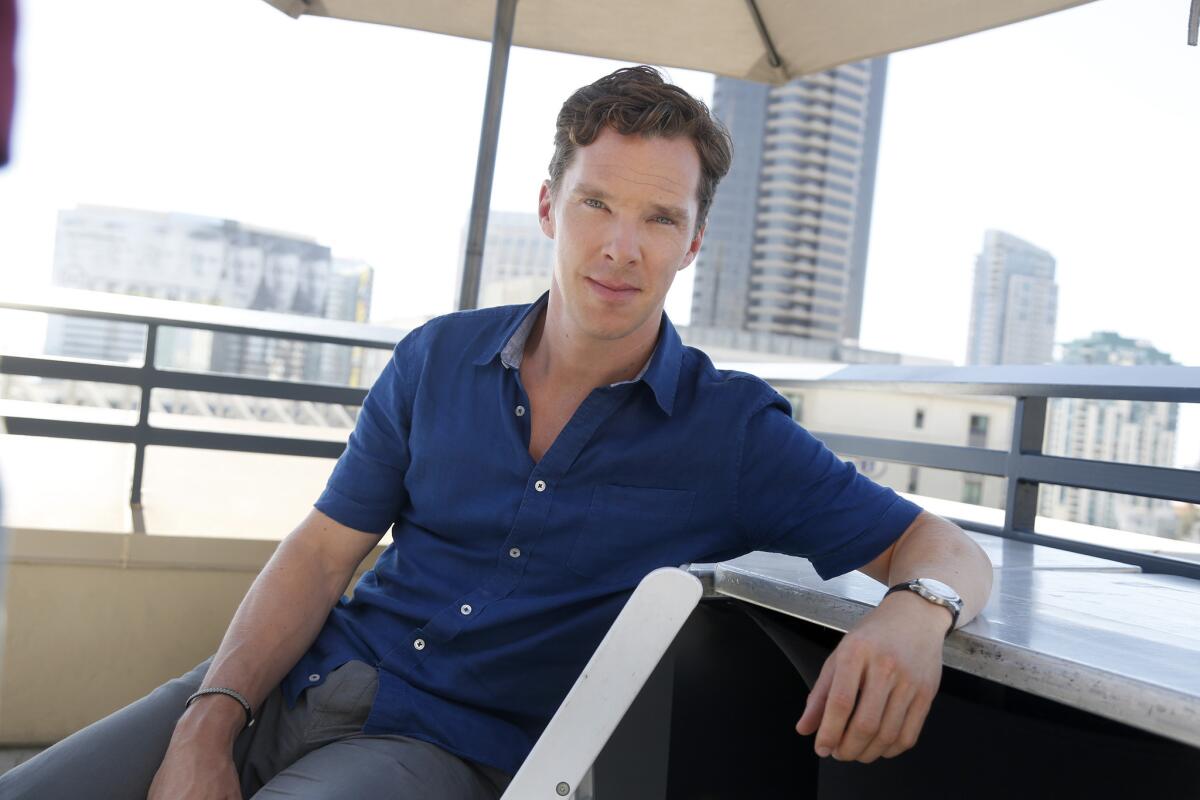Q&A: Benedict Cumberbatch, the thinking man’s alpha wolf

- Share via
During his first trip to Comic-Con in July, Benedict Cumberbatch stopped to chat about his many brainy characters, from the detective he plays on the BBC’s “Sherlock” and the World War II codebreaker Alan Turing, whom he portrays in the upcoming movie “The Imitation Game,” to Hamlet and an animated wolf.
You’re here for “Penguins of Madagascar,” an animated movie in which you voice a wolf who looks like he’s the brains of the operation. Have I got it just about right?
Kind of. He’s the leader, the alpha wolf of the pack, so to speak, and does things in a polar opposite way, pun intended, to the penguins.
I noticed you’re often playing really smart guys — Sherlock, Julian Assange, Alan Turing in this movie coming up, the famous codebreaker, and I wonder, do you have a go-to, ‘I’m a genius thinking really hard’ …
... Smart face?
Yeah.
Definitely. [Cumberbatch furrows his brow and rests his chin in his hand]
No, it changes. It’s about the character. I’ve been very, very fortunate that there’s something going on behind my eyes so that it looks like I’m ... encompassing the brilliance of their minds and ability to concentrate. But you know I have a very superficial, skin-thin understanding of the science. ... It’s just about finding the humanity in all of that. Brilliant people have private moments of self-doubt and things which we could all relate to, but they also have these extraordinary moments of discovery or pioneering brilliance that pushes the envelope in how we view the world. I try not to pull faces — if I do, it has to be something with the character.
Darn, so you’re not really just thinking about what you’re having for lunch?
Yeah, exactly — “Why did I eat that cheeseburger? I should have stuck to the salad.” Actors often have that kind of a feeling, especially on stage when you’re struggling through the weirdness of your day and you’re doing the play for the umpteenth time in a long run, that’s very often something that happens: Your mind drifts and you think, “I forgot to buy the cheese in the supermarket!” You have to be careful of those mundanities creeping in because they can play havoc with your concentration.
Speaking of the stage, you’re going to be playing Hamlet in London next year. What does that particular role mean to you?
A lot. It’s something that’s been in my life for a long time. I was offered it at school and turned it down to do my “A” levels and try and get some decent grades. ... I’m of an age now where I think it’s now or never ,and I’ve found the right director ... this brilliant female director called Lindsey Turner, who’s just a phenomenon. I think she’s the greatest director of her generation, I’ll be that bold, and she’s a good friend and great collaborator. We’ve been talking about it for over a year already, and we don’t even start rehearsals until next June.
Most actors, [Hamlet] appeals to them initially because it feels like an everyman part, which it is, to an extent, you have to bring a lot of yourself to it. ... The other appeal is the amount of direct communication you have with your audience. There’s such a large portion of it where you become very intimate. You should care about him a lot, but he should make you laugh as well as feel things.
He has, as a lot of Shakespeare’s characters do, wonderful insights into human nature and certain problems with the human condition, whether it’s depression or anxiety, or the idea of not being able to do something or being inactive, being powerless and how to treat that with humor, self-laceration, anger and action and then this incredible journey to a point where he’s just calm, where there’s this very Buddhist, “let it be” quality to an acceptance really of fate.
Like Hamlet, Sherlock is a role many actors have played. What do you think it is about that character that has resonated for so many different generations?
Well, he’s the original. He’s the blueprint for all detectives. The ability to analyze a situation and come to a conclusion, this incredible mental agility he has through hard work and application, is something that’s also humanly obtainable. He’s not superhuman, there’s no trickery to it. Some of the plot points, some of the deductions stretch credulity a little bit, but it’s something if you worked hard enough at you could actually do yourself.
In our version, in the 21st century, he has to think and work at the speed of multimedia and modern forensic science. Being an original and always a modern man in his time in the original inception of the stories, he was the first to go back casting footprints, analyzing cigarette ash into concrete evidence of someone’s guilt. All of these things, they’re not tricks, they’re hard-learned skills and that in our version has to be ramped to another degree. And also you get to see a guy who’s just slightly on the edge of being different and he’s a hero for people who feel they are slightly different or maybe slightly on the edge of society.
Last question — you could walk the halls of Comic-Con dressed as anyone you want. No one would recognize you.
John Malkovich.
John Malkovich?
Yeah. He’s here. So why isn’t everyone wearing Malkovich Malkovich Malkovich Malkovich Malkovich. We’ve seen the film right? Let’s do it. Let’s Spike Jonze it. I’m up for that.
More to Read
The complete guide to home viewing
Get Screen Gab for everything about the TV shows and streaming movies everyone’s talking about.
You may occasionally receive promotional content from the Los Angeles Times.







